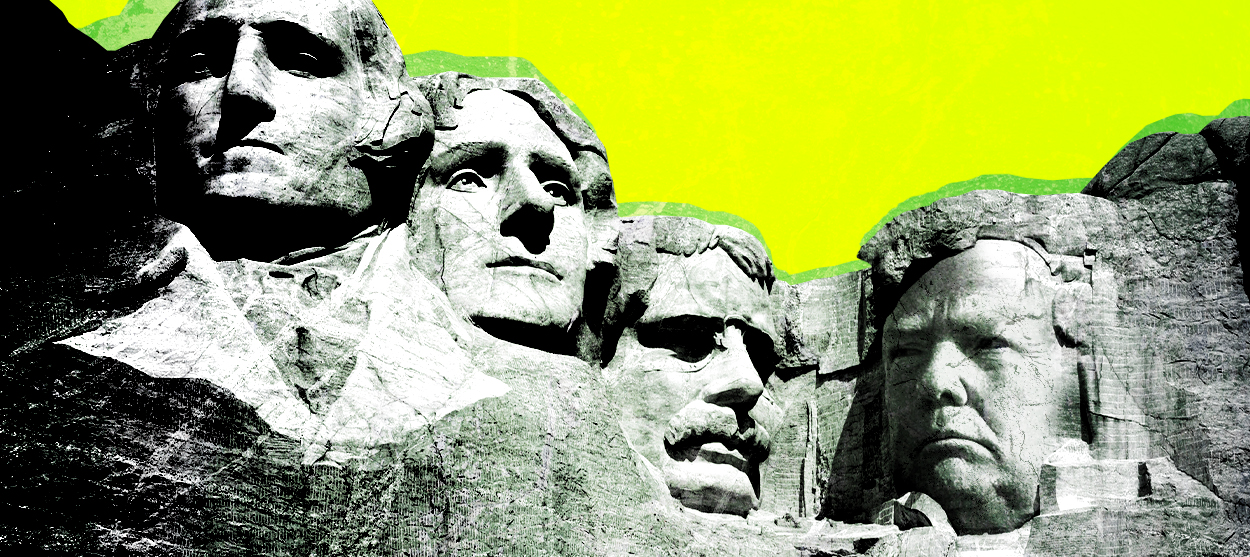Get ready for the Trump revisionism
One final challenge for the media


A free daily email with the biggest news stories of the day – and the best features from TheWeek.com
You are now subscribed
Your newsletter sign-up was successful
In January of 2017, a few days before the inauguration of Donald Trump, Washington Post media columnist Margaret Sullivan wrote a piece warning of a "hellscape of lies and distorted reality" awaiting journalists covering the new president. She was, unfortunately, right: The Trump presidency brought dishonesty at unprecedented and unfathomable levels. Now, as the sun sets on the era, we — both journalists and the public — must get ready for another kind of dishonesty: widespread distortions of the historical record.
As a journalist, I'm generally hesitant to make public predictions; it's my business to write about what has happened, not what might. But, having closely observed the last four years, I feel strongly that we as a nation are about to face a Category 5 hurricane of lies and mischaracterizations about what we just experienced. And it's important that we prepare. But, first, let me explain my prediction.
Even before Donald Trump arrived in Washington, Americans weren't very good at seeing ourselves clearly. As a country, we barely acknowledge what we did to this continent's indigenous inhabitants. (The governor of California recently made headlines when he — accurately — used the word "genocide" to describe the state's sins.) Our history textbooks erroneously call slaves "workers" and some Southern plantations have, appallingly, become wedding venues. And this retrospective self-flattery isn't just a fringe phenomenon: In recent years, seemingly authoritative storytellers like Ken Burns and David McCullough have faced scrutiny for their tendencies to whitewash.
The Week
Escape your echo chamber. Get the facts behind the news, plus analysis from multiple perspectives.

Sign up for The Week's Free Newsletters
From our morning news briefing to a weekly Good News Newsletter, get the best of The Week delivered directly to your inbox.
From our morning news briefing to a weekly Good News Newsletter, get the best of The Week delivered directly to your inbox.
This trend isn't just visible in the stories we do and don't tell, it's also seen in our inability to hold bad political actors accountable. Former Secretary of State Henry Kissinger hobnobs with presidents and other powerful people despite his "horrifying resume." Former President George W. Bush has, in a little over a decade, morphed from the man who led us into "the worst foreign policy disaster in American history" on false pretenses, authorized torture, and oversaw a tragically inept response Hurricane Katrina into a folksy, friendly guy who hangs out with Ellen DeGeneres, gets hugs from Michelle Obama, and likes to paint. Trump's first press secretary, Sean Spicer, left the White House after lying repeatedly and brazenly to the American people and yet quickly reappeared, salsa dancing in a garish fluorescent shirt, on Dancing With the Stars. This does not bode well for how we'll treat Trump's other enablers and acolytes.
During the Trump years, we saw our collective capacity for reality distortion pick up terrifying speed. Trump's presidential campaign served up "a daily avalanche of wrongness," and his presidency was somehow worse. He lied at rallies, in the Oval Office, and on Twitter; he lied about Stormy Daniels, COVID-19, and countless other issues. According to the Washington Post, he averaged more than 50 false or misleading statements per day. Compounding the problem of a truth-allergic commander-in-chief was a news media that too often soft-pedaled Trump's untruths or simply carried them live on-air, thereby further tilting the proverbial "first draft of history" in his favor. And yet the media still far surpassed Trump's own party in its ability to describe the president accurately. Mitt Romney, one of few Republicans to even dare mention Trump's mendacity, recently described Trump's relationship with the truth as "relaxed." Really, Mitt? That's how we're describing someone who told more than 20,000 false or misleading claims as president?
While we're tallying the reasons to expect a wave of retrospective B.S., we should acknowledge the strong incentives that many will have to avoid describing this era with the unflinching honesty it deserves. Certainly politicians will have a vested interest in obscuring the things they did, and didn't do, during the last four years; their political and reputational survival may depend on it. We are already seeing indications of this from officials like former Department of Homeland Security Chief of Staff Miles Taylor, who became an outspoken critic of the Trump administration despite his previous participation in some of its worst policies, and Republican Senator Ben Sasse of Nebraska, who seems to be tip-toeing away from Trump despite voting with him more than 85 percent of the time. Meanwhile, Texas GOP Senator John Cornyn has already begun feigning outrage about Democratic non-transparency as if the last four years didn't happen.
Institutions, too, will have an interest in airbrushing their Trump-era records. The tech company Hootsuite will want us to forget that it planned to work with ICE before employees spoke up. CBS will want us to forget that their CEO ever said that Donald Trump's presidential candidacy "may not be good for America, but it's damn good for CBS." Twitter will want us to forget that it waited until Trump's fourth year in office to start flagging misleading or inaccurate tweets, and never shut down his toxic account altogether. Law firms will want us to forget that they took part in Trump's bad-faith, anti-democratic attacks on the election. The list goes on and on.
A free daily email with the biggest news stories of the day – and the best features from TheWeek.com
And despite my best intentions, I think that even I, and other folks who were deeply uncomfortable during the last four years, will have a hard time remembering it clearly, precisely because of the discomfort. This era was just so extreme and aberrant, the pace and content of the stories so brutal, that we're just not designed to remember it accurately. It jammed our mental circuits. In the days since Biden's victory, suppressed memories of the Trump presidency have bubbled up into my conscious mind. Remember when Trump pardoned Sheriff Joe Arpaio and commuted Roger Stone's prison sentence? The Boy Scout speech? When he pushed aside the prime minister of Montenegro? When he denied the death toll of Hurricane Maria in Puerto Rico? When he dismissed a rape allegation by saying "she's not my type"? To see the Trump years accurately requires a willingness to crawl back into the bed of nails in which we've been sleeping.
And yet we must, because a precise history will be essential for ensuring that such widespread cruelty and corruption never descends again.
With this in mind, there are certain practical measures Americans can individually take to prepare for the wave of revisionist history that we're about to face. You can save the newspapers and magazines from the era, and take PDFs and screenshots of online content that's liable to disappear, like, say, Senator Lindsey Graham's May 2016 tweet that reads, "If we nominate Trump, we will get destroyed.......and we will deserve it." You can collect comprehensive guides to Trump's presidency like McSweeney's "CATALOG OF TRUMP'S WORST CRUELTIES, COLLUSIONS, CORRUPTIONS, AND CRIMES," The New York Times's compendium of his Twitter insults, and the Toronto Star's tally of Trump lies, that give a high-altitude sense of the sweeping criminality, hate, and dishonesty that defined the era. You can save your own personal digital and physical ephemera from the era — the text messages, emails, letters, diary entries, phone photos, Facebook posts — that reflect the last four years, and how you responded to them.
Beyond these steps, it's important that we shift how we see the act of remembering itself. It's time to reject any idea that memory is a passive, effortless activity. Just as reporting the truth is a difficult and laborious task, so is remembering it. It involves fighting, sifting, searching, fact-checking, pushing back, and engaging in difficult conversations with yourself and with others.
It's also time to retire phrases like "the wrong side of history" and "history will not be kind to [insert name]" that, as the Trump years went on, felt more like a naive form of self-soothing than any kind of useful description of the world. Such platitudes ignore the facts that people like Brian Kilmeade and Bill O'Reilly write best-selling history books, that Donald Trump will get his own presidential library and perhaps an astonishingly lucrative book deal, and that this country erected hundreds of statues for members of the losing side of the Civil War.
Above all, we must reject the idea that memory and history are apolitical. Because one of the enduring lessons of the Trump era is that absolutely everything is political, from the news outlets we consult, to the pronouns we use, to the brands we support and boycott, to the holidays we observe (like Columbus Day) and don't observe (like Juneteenth), to the weather.
To be clear, it is a very bad sign that we are in a moment where, as CNN anchor and reporter Jim Sciutto tweeted, "Somehow, accepting reality has now become a sign of great courage and character." But the good news is that, in the months and years to come, the mere act of remembering — accurately and unsparingly and uncomfortably — will be one of the most accessible steps toward creating a better future. It's something anyone can do without ever leaving their couch.
History isn't something that happens elsewhere; we all have a role in constructing it, and rejecting perversions of it.
Philip Eil is a freelance journalist based in Providence, Rhode Island. He is the former news editor of the alt-weekly, the Providence Phoenix. And since that paper closed in 2014, he has contributed to The Atlantic, Men’s Health, VICE, The Boston Globe, Literary Hub, and Columbia Journalism Review, among other outlets.
-
 Political cartoons for February 7
Political cartoons for February 7Cartoons Saturday’s political cartoons include an earthquake warning, Washington Post Mortem, and more
-
 5 cinematic cartoons about Bezos betting big on 'Melania'
5 cinematic cartoons about Bezos betting big on 'Melania'Cartoons Artists take on a girlboss, a fetching newspaper, and more
-
 The fall of the generals: China’s military purge
The fall of the generals: China’s military purgeIn the Spotlight Xi Jinping’s extraordinary removal of senior general proves that no-one is safe from anti-corruption drive that has investigated millions
-
 The billionaires’ wealth tax: a catastrophe for California?
The billionaires’ wealth tax: a catastrophe for California?Talking Point Peter Thiel and Larry Page preparing to change state residency
-
 Bari Weiss’ ‘60 Minutes’ scandal is about more than one report
Bari Weiss’ ‘60 Minutes’ scandal is about more than one reportIN THE SPOTLIGHT By blocking an approved segment on a controversial prison holding US deportees in El Salvador, the editor-in-chief of CBS News has become the main story
-
 Has Zohran Mamdani shown the Democrats how to win again?
Has Zohran Mamdani shown the Democrats how to win again?Today’s Big Question New York City mayoral election touted as victory for left-wing populists but moderate centrist wins elsewhere present more complex path for Democratic Party
-
 Millions turn out for anti-Trump ‘No Kings’ rallies
Millions turn out for anti-Trump ‘No Kings’ ralliesSpeed Read An estimated 7 million people participated, 2 million more than at the first ‘No Kings’ protest in June
-
 Ghislaine Maxwell: angling for a Trump pardon
Ghislaine Maxwell: angling for a Trump pardonTalking Point Convicted sex trafficker's testimony could shed new light on president's links to Jeffrey Epstein
-
 The last words and final moments of 40 presidents
The last words and final moments of 40 presidentsThe Explainer Some are eloquent quotes worthy of the holders of the highest office in the nation, and others... aren't
-
 The JFK files: the truth at last?
The JFK files: the truth at last?In The Spotlight More than 64,000 previously classified documents relating the 1963 assassination of John F. Kennedy have been released by the Trump administration
-
 'Seriously, not literally': how should the world take Donald Trump?
'Seriously, not literally': how should the world take Donald Trump?Today's big question White House rhetoric and reality look likely to become increasingly blurred
